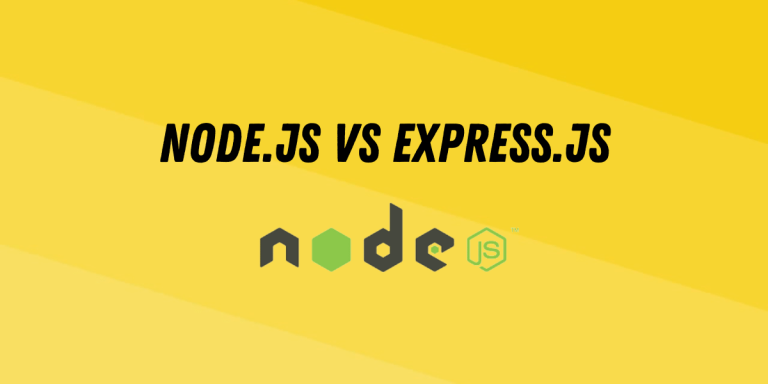NodeJS is an open-source, cross-platform runtime environment used for creating fast, data-intensive, and secure applications. NodeJS is not a programming language nor a framework, it is a development environment that uses JavaScript to write server-side code.
Whereas ExpressJS is a framework that also uses JavaScript for creating server-side applications but requires less development time than Node.js as it is easy to set up and can handle errors efficiently.
There are many criteria by which we can compare both technologies to choose the best for a project. Let’s see them one by one.
Also read: Node.js vs Vanilla JavaScript – What are the similarities and differences?
NodeJS vs ExpressJS – At a Glance
| Criteria | NodeJS | ExpressJS |
|---|---|---|
| Performance and Speed | Fast Execution Speed due to V8 engine and non-blocking I/O operations. | Built on NodeJS, provides high performance and speed. |
| Scalability | Good choice for developing a scalable application. | Enhanced NodeJS by providing more advanced features and making the application more scalable. |
| Portability | Compatible with different operating systems like Windows, Linux, and Mac. | Compatible with different operating systems like Windows, Linux, and Mac. |
| Community Support | A large and active global community. | Popular framework with many starts and forks on Github. |
| Libraries and Tools Availability | Millions of libraries and tools can be installed using Node Package Manager. | ExpressJS is a library of NodeJS. |
| Use Cases | Used for server-side rendering for SPA, Data streaming Apps, and Data Intensive Real-Time Applications. | Used for creating fast and small servers, microservices, and REST APIs. |
| Learning Curve | Documentation is complex and hard to understand. | Easy to start with basic knowledge of NodeJS, fewer codes and less time to build an application. |
| Real World Example | Used by PayPal, Linkedin, GoDaddy, and Netflix. | Used by Accuweather, Yummly, MySpace, and Accenture. |
Performance and Speed
The Node.js is built upon the V8 engine which provides fast execution speed as it compiles the source code into native instructions in one go. NodeJS uses non-blocking I/O operation which makes it lightweight and provides many asynchronous methods which increase performance.
ExpressJS, on the other hand, is a minimal and flexible framework, that provides many advanced features such as a router and controller but it doesn’t handle async routers very well. The performance depends upon the architecture of the technology, since ExpressJS is also built upon NodeJS, the architecture is the same thus both NodeJS and ExpressJS provide high performance and speed.
Scalability
ExpressJS is the most popular framework for creating web applications it is minimal, flexible, and based on NodeJS. ExpressJS is built on top of NodeJS it enhanced NodeJS by providing more advanced features such as controllers, and routers. It adds the concept of middleware, even Node.js doesn’t support the view module which is supported in ExpressJS helps in making the application much more scalable. Recently ExpressJS integrated body-parse to parse request body which is used to handle form or any other incoming data.
NodeJS can be a good choice for developing a scalable application but when compares to ExpreeJS, it extends NodeJS and provides more advanced concepts and features.
Portability
NodeJS and ExpressJS can’t compare in terms of portability as both are portable and can run on any machine that has a NodeJS development environment to execute its code. They are compatible with different operating systems like Windows, Linux, and Mac.
Community Support
NodeJS has a vast and active global community. The Github starts and forks for ExpreeJS are more than NodeJS which describes that ExpressJS is more popular but since NodeJS is also used by other popular frameworks such as AdonisJS, NestJS, and even ExpressJS, their community is considered to be a part of it, so Node.js is considered to have more community support.
Libraries and Tools Availability
NodeJS provides many libraries for creating different kinds of projects such as Gulp which help in automating tasks, async which allows you to write asynchronous JavaScript code, Cheerio for web scraping, etc. There are millions of libraries and tools that can install using Node Package Manager which is the world’s largest repository of libraries whereas ExpressJS itself is a library of NodeJS.
Use Cases
NodeJS is best suited for server-side rendering for SPA, Data streaming Apps like video conferencing, chat applications, etc, and Data Intensive Real-Time Applications that can easily interact with files, and supports all kinds of Databases, relational, and NoSQL whereas Express is best for creating fast and small servers, microservices and REST APIs as it provides the support of routers and controllers.
Learning Curve
Learning ExpressJS is easy than NodeJS. NodeJS documentation is complex and hard to understand whereas ExpressJS is easy to start, but it requires a basic knowledge of NodeJS since ExpressJS does not come with database integration features so NodeJS or any other external module is needed to be used for that. ExpressJS takes less time and fewer codes to build an application in comparison to Node.js.
Real World Example
NodeJS is used by many popular companies like PayPal, Linkedin, GoDaddy, and Netflix whereas ExpressJS is used by Accuweather, Yummly, MySpace, and Accenture.
Conclusion
NodeJS builds everything from zero, which gives the ultimate power to the developers to write code according to their own conventions, whereas ExpressJS provides many pre-defined methods which make it easy to create an application using fewer lines of code and requiring less time.
If the requirement is to create a small application in less time with fewer lines of code then ExpressJS is best whereas if it requires developing a highly scalable, data-intensive application which can interact with all kinds of databases and provides more control then go with NodeJS.





